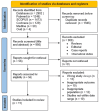Effectiveness of Web-Based Cognitive Behavioral Therapy for Depression: A Systematic Review of Randomized Controlled Trials
- PMID: 39697935
- PMCID: PMC11655089
- DOI: 10.7759/cureus.73905
Effectiveness of Web-Based Cognitive Behavioral Therapy for Depression: A Systematic Review of Randomized Controlled Trials
Abstract
Evidence-based practices were more effective in managing mental health disorders when compared to traditional, non-evidence-based approaches. Web-based cognitive behavioral therapy (CBT) interventions offer a wide variety of advantages among depressed patients as they offer a sense of anonymity, privacy, and accessibility. This systematic review of randomized controlled trials (RCTs) aims to estimate the efficacy of several types of web-based interventions among patients with depression symptoms. This review was conducted according to the principles of the Cochrane Handbook for Systematic Reviews of Interventions and reported following the Preferred Reporting Items for Systematic Reviews and Meta-Analyses (PRISMA) guidelines. We searched the literature using five databases: PubMed, Medline, Ovid, Cochrane CENTRAL, and Scopus. Key terms for depression and web-based CBT included "Depression", "Cognitive behavioral therapy", "CBT", "Effectiveness", "Internet", and "Web-based". The included studies were published between 2019 and 2024 and assessed the risk of bias (ROB) using the ROB2 tool for RCTs. This search strategy yielded 2902 records, of which 1946 were duplicates and removed. The remaining 956 records underwent screening of their titles and abstracts, and 900 records were excluded. The full texts of the remaining 56 records were retrieved; 45 of them were excluded since 13 had the wrong study design, 10 had inappropriate outcomes, 12 had inappropriate populations, and 10 were out of the date range. All the included studies were 11 RCTs. Most studies assessed the efficacy of internet-based CBT (ICBT) or web-delivered CBT (wCBT). Control groups included the waitlist control (WLC) group and the treatment as usual (TAU) group, and one study included an active control group. Six studies compared the effects of guided or self-guided ICBT with control, three compared wCBT with control, one used internet self-guided intervention, and one employed an internet-based Functional Depression (iFD) program. Interventions were generally self-guided or guided by laypersons, nonspecialists, or automated systems. It can be concluded that despite the significance of most interventions favoring internet-based interventions compared to control groups, many limitations existed in the included studies, making it unclear whether the interventions would prove conclusive and reliable benefits. Therefore, more studies should be conducted on larger sample populations with prolonged duration.
Keywords: cognitive behavioral therapy; depression; interventions; randomized controlled trials; web-based.
Copyright © 2024, Alzilfi et al.
Conflict of interest statement
Conflicts of interest: In compliance with the ICMJE uniform disclosure form, all authors declare the following: Payment/services info: All authors have declared that no financial support was received from any organization for the submitted work. Financial relationships: All authors have declared that they have no financial relationships at present or within the previous three years with any organizations that might have an interest in the submitted work. Other relationships: All authors have declared that there are no other relationships or activities that could appear to have influenced the submitted work.
Figures
References
-
- Machine learning in ADHD and depression mental health diagnosis: a survey. Nash C, Nair R, Naqvi SM. IEEE Access. 2023;11:86297–86317.
Publication types
LinkOut - more resources
Full Text Sources



